I've followed the material documentation for top app bars and implemented a part of it in my app to be able to hide it, when scrolling down my list.
My Layout:
<?xml version="1.0" encoding="utf-8"?>
<androidx.coordinatorlayout.widget.CoordinatorLayout xmlns:android="http://schemas.android.com/apk/res/android"
xmlns:tools="http://schemas.android.com/tools"
android:layout_width="match_parent"
android:id="@+id/ddd"
android:layout_height="match_parent"
xmlns:app="http://schemas.android.com/apk/res-auto"
tools:context=".pkgTestforend.DriverListFragment">
<com.example.dochjavatestimplementation.pkgTestforend.CustomLinearLayout
android:layout_width="match_parent"
android:id="@+id/cusLL"
android:layout_height="match_parent"
app:elevation="0dp">
<RelativeLayout
android:layout_width="match_parent"
android:layout_height="match_parent">
<ListView
android:id="@+id/listAllDrivers"
android:layout_width="match_parent"
android:layout_height="match_parent"/>
</RelativeLayout>
</com.example.dochjavatestimplementation.pkgTestforend.CustomLinearLayout>
<com.google.android.material.appbar.AppBarLayout
android:layout_width="match_parent"
android:layout_height="wrap_content"
app:liftOnScroll="true" >
<com.google.android.material.appbar.MaterialToolbar
android:id="@+id/topAppBar"
android:layout_width="match_parent"
android:layout_height="?attr/actionBarSize"
app:title="PageTitle"
app:menu="@menu/top_app_bar"
app:layout_scrollFlags="scroll|enterAlways|snap"
app:navigationIcon="@drawable/baseline_menu_24"
style="@style/Widget.MaterialComponents.Toolbar.Primary"
/>
</com.google.android.material.appbar.AppBarLayout>
</androidx.coordinatorlayout.widget.CoordinatorLayout>
And the corresponding fragment:
public class DriverListFragment extends Fragment implements View.OnClickListener {
public DriverListFragment() {
}
public static DriverListFragment newInstance(String param1, String param2) {
return new DriverListFragment();
}
@Override
public void onCreate(Bundle savedInstanceState) {
super.onCreate(savedInstanceState);
setHasOptionsMenu(true);
}
@Override
public View onCreateView(LayoutInflater inflater, ViewGroup container, Bundle savedInstanceState) {
View view = inflater.inflate(R.layout.fragment_driver_list, container, false);
setUpToolbar(view);
return view;
}
private void setUpToolbar(View view) {
Toolbar toolbar = view.findViewById(R.id.topAppBar);
AppCompatActivity activity = (AppCompatActivity) getActivity();
if (activity != null) {
activity.setSupportActionBar(toolbar);
}
}
@Override
public void onCreateOptionsMenu(Menu menu, MenuInflater menuInflater) {
menuInflater.inflate(R.menu.top_app_bar, menu);
super.onCreateOptionsMenu(menu, menuInflater);
}
ListView listViewDriver;
DriverListAdapter adapter;
RoomWithRxJavaViewModel viewModel;
public void onViewCreated(View view, @Nullable Bundle savedInstanceState) {
listViewDriver = view.findViewById(R.id.listAllDrivers);
viewModel = new RoomWithRxJavaViewModel(getActivity().getApplication());
Disposable d = viewModel.getDrivers()
.subscribe(allusers ->
{
adapter = new DriverListAdapter(getContext(), (ArrayList<Driver>) allusers);
listViewDriver.setAdapter(adapter);
}, e -> {
//show err mes
}
);
}
}
The setup is pretty simple build. I just have a custom linearlayout which I am planning to modify later. And yes, the relative layout for the listview is on purpose so I can easily modify my future button positions.
The result looks like this:
So the issue is that, altough the app bar at the top is visible, it wont hide when I scroll down my list (see picture above), eventough I am using app:liftOnScroll="true" and app:layout_scrollFlags="scroll|enterAlways|snap".
What am I missing exactly? Is it cause I use my custom linearlayout? Putting the appbar before the custom linearlayout didn't change the output unfourntatly.
